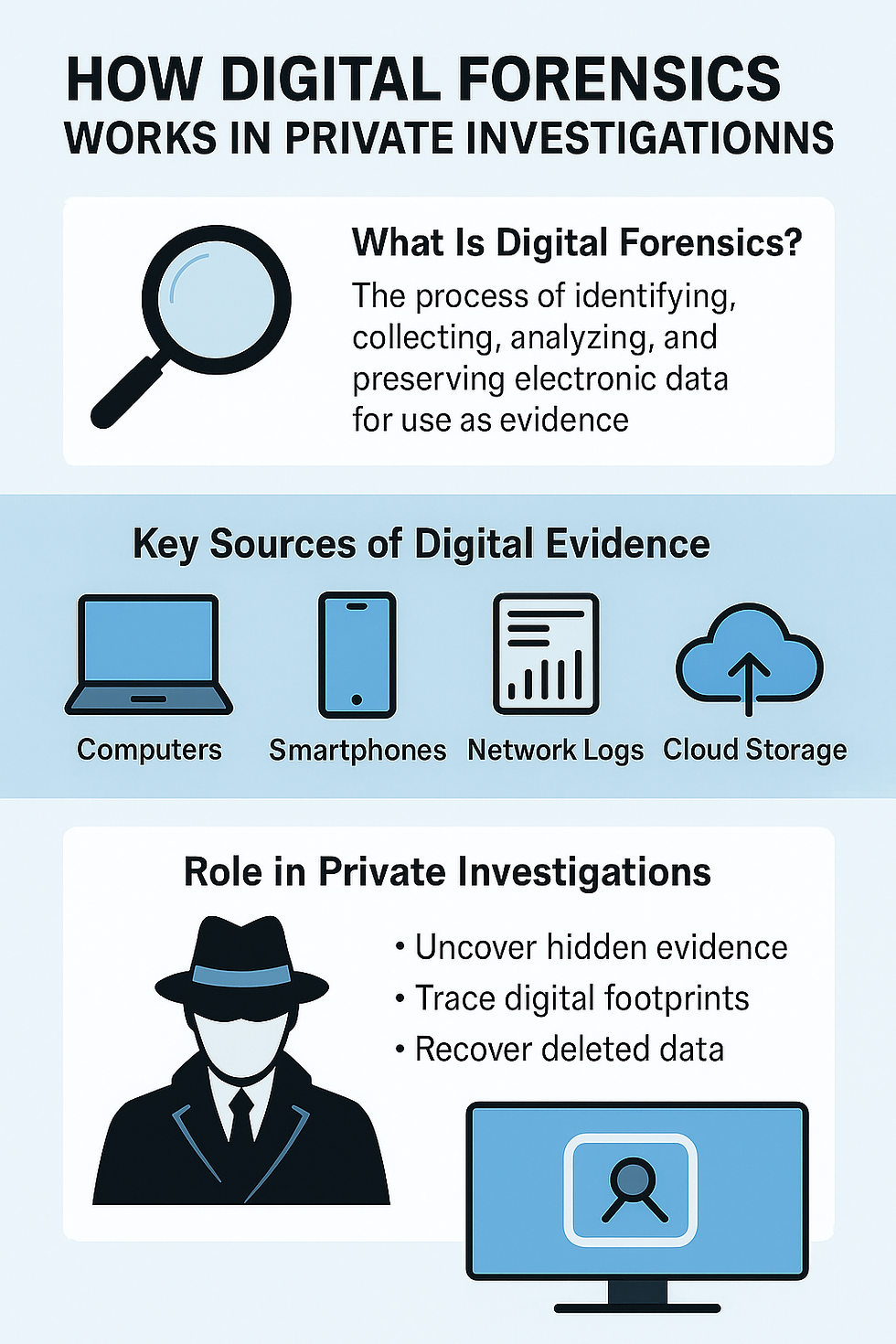How Digital Forensics Works in Private Investigations: 12 Essential Insights
- Sam Spade

- Jul 30
- 3 min read
In our ever evolving hyper-connected world, nearly every action leaves a digital trail. From emails and text messages to GPS data and social media interactions, digital evidence can make or break a case. For private investigators, digital forensics has become a cornerstone of modern investigative practice—an indispensable tool for uncovering the truth.
Here’s a breakdown of how digital forensics works in private investigations and why it’s so essential.

1. What Is Digital Forensics?
Digital forensics is the process of identifying, preserving, analyzing, and presenting digital evidence in a forensically sound manner. This discipline ensures that electronic data from devices such as phones, computers, and networks can be used legally in court or in private dispute resolutions.
2. Why Private Investigators Use Digital Forensics
Private investigators (PIs) use digital forensics to go beyond the physical world, tracing hidden behaviors, uncovering fraud, and building timelines from electronic activity. Whether it’s for civil litigation, infidelity, employee misconduct, or corporate fraud, digital evidence often holds the key.
3. Key Sources of Digital Evidence
Smartphones and tablets (text messages, GPS data, apps)
Computers and laptops (emails, files, browser history)
External storage devices (USB drives, SD cards)
Cloud services (Google Drive, iCloud, Dropbox)
Social media and messaging apps (Facebook, Instagram, WhatsApp)
Network logs and IP data
4. Preservation of Digital Evidence
Before any analysis occurs, data must be preserved using write-blockers and forensic imaging tools. This ensures that the original information remains unaltered and admissible in court, which is vital for both legal and ethical integrity.
5. Data Recovery Techniques
Private investigators often employ forensic software to recover deleted files, emails, call logs, and metadata. Even when data appears erased, digital forensics can reconstruct fragments left behind on storage media.
6. Metadata Analysis
Metadata—the data about data—reveals when a file was created, modified, accessed, or transferred. In legal cases, this information can help establish alibis, timelines, and intent.
7. Social Media & Online Behavior
A person’s digital life can be a treasure trove of evidence. Forensic techniques allow PIs to gather and analyze social media posts, private messages, check-ins, photos, and online interactions that support or contradict a subject’s story.
8. Email & Communication Analysis
In cases of harassment, impersonation, or internal fraud, PIs analyze email headers, timestamps, attachments, and IP logs. These investigations can uncover phishing attempts, insider threats, or inappropriate conduct.
9. Cloud and Remote Server Forensics
Much of today’s data is stored in the cloud. Digital forensic experts use legal methods to obtain and analyze cloud-stored documents, chat histories, and logins. This is especially relevant in corporate and civil investigations.
10. Legal Compliance and Admissibility
Digital forensic investigations must comply with local, state, and federal laws—especially in licensed states like California. Private investigators must follow chain of custody protocols, document every step, and use legally compliant tools and methods to ensure evidence holds up in court.
11. Types of Cases Where Digital Forensics Is Crucial
Infidelity & Divorce – Recovering deleted messages, call logs, or secret apps
Employee Misconduct – Tracking insider threats or IP theft
Corporate Espionage – Analyzing device access and data exfiltration
Cyberstalking & Harassment – Unmasking anonymous actors online
Insurance Fraud – Correlating metadata and timeline discrepancies
Missing Persons – Tracing last known digital activity
12. Working with a Licensed Digital Forensics Expert
In many states—including California—private investigators must be licensed to conduct investigative services, including digital forensics. At Spade & Archer®, we provide licensed, court-ready digital forensics services across the San Francisco Bay Area, from Napa to Silicon Valley.
With advanced forensic tools, legally compliant practices, and deep investigative experience, Spade & Archer® helps clients—legal teams, corporations, and private individuals—uncover the digital evidence they need to build a strong case.
📞 Call us at (707) 908-8226 or (415) 715-1956
📧 Email: intake@SpadeAndArcher.com
🌐 Website: www.PrivateInvestigator.fyi
Bottom Line:
Digital forensics is not just about recovering files; it’s about telling a story with data. When conducted professionally and lawfully, digital forensic investigations can uncover hidden truths and provide critical insights that paper trails alone cannot.
Whether you're handling a corporate matter, legal dispute, or personal concern—choosing the right digital forensic investigator is key.




Comments